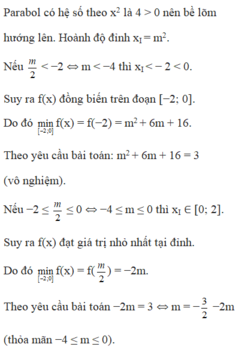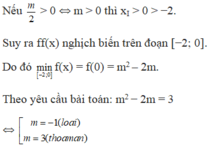Hãy nhập câu hỏi của bạn vào đây, nếu là tài khoản VIP, bạn sẽ được ưu tiên trả lời.

TH1: m + 1 = 0 <=> m = -1 thay vào bpt ta có: 4 > 0 với mọi số thực x
=> m = - 1 thỏa mãn
TH2: m \(\ne\)-1
bpt có tập nghiệm S = R
<=> \(\hept{\begin{cases}\Delta'\le0\\m+1>0\end{cases}}\Leftrightarrow\hept{\begin{cases}\left(m+1\right)^2-4\left(m+1\right)\le0\\m>-1\end{cases}}\)
<=> \(\hept{\begin{cases}\left(m+1\right)\left(m-3\right)\le0\\m>-1\end{cases}}\Leftrightarrow-1< m\le3\)
Kết hợp 2 TH: ta có: \(-1\le m\le3\) thì bpt có tập nghiệm: S = R
Đặt ( m + 1 ).x2 - 2. ( m-1 ) .x + 4 \(\ge\)0 ( 1 )
+) TH1 : m+ 1 = 0 <=> m =-1 .Bất phương trình ( 1 ) trở thành 4 \(\ge\)0 \(\forall x\inℝ\)( luôn đúng ) ( *)
+) TH2 : m + 1 \(\ne\)0 <=> m \(\ne\)-1 .Bất phương trình ( 1 ) có tập nghiệm \(S=ℝ\)
<=> \(\hept{\begin{cases}a>0\\\Delta'\le0\end{cases}\Leftrightarrow\hept{\begin{cases}m+1>0\\\Delta'=m^2-2m-3\le0\end{cases}\Leftrightarrow}-1< m\le3\left(^∗^∗\right)}\)
Từ ( *) và ( **) ta suy ra : \(-1\le m\le3\)

Đề bài có vấn đề thì phải, chỗ \(4m^2\) thấy sai sai
\(f\left(x\right)=\left(2x-m\right)^2-2m\)
- TH1: \(\frac{m}{2}\in\left[0;2\right]\Rightarrow0\le m\le4\)
Khi đó \(f\left(x\right)_{min}=f\left(\frac{m}{2}\right)=-2m=3\Rightarrow m=-\frac{3}{2}\left(ktm\right)\)
- TH2: \(\frac{m}{2}< 0\Rightarrow f\left(x\right)\) đồng biến trên \(\left[0;2\right]\)
\(\Rightarrow f\left(x\right)_{min}=f\left(0\right)=m^2-2m=3\)
\(\Rightarrow m^2-2m-3=0\Rightarrow\left[{}\begin{matrix}m=-1\\m=3>0\left(l\right)\end{matrix}\right.\)
TH3: \(\frac{m}{2}>2\Leftrightarrow m>4\Rightarrow f\left(x\right)\) nghịch biến trên \(\left[0;2\right]\)
\(\Rightarrow f\left(x\right)_{min}=f\left(2\right)=16-8m+m^2-2m=3\)
\(\Leftrightarrow m^2-10m+13=0\Rightarrow\left[{}\begin{matrix}m=5+2\sqrt{3}\\m=5-2\sqrt{3}< 4\left(l\right)\end{matrix}\right.\)
\(\Rightarrow\sum m=-1+5+2\sqrt{3}=\)

Lời giải:
$f(x)=m^2(x^4-1)+m(x^2-1)-6(x-1)=(x-1)[m^2(x+1)(x^2+1)+m(x+1)-6]$
Để $f(x)\geq 0$ với mọi $x\in\mathbb{R}$ thì:
$m^2(x+1)(x^2+1)+m(x+1)-6=Q(x)(x-1)^k$ với $k$ là số lẻ
$\Rightarrow h(x)=m^2(x+1)(x^2+1)+m(x+1)-6\vdots x-1$
$\Rightarrow h(1)=0$
$\Leftrightarrow 4m^2+2m-6=0$
$\Leftrightarrow 2m^2+m-3=0$
$\Leftrightarrow (m-1)(2m+3)=0\Rightarrow m=1$ hoặc $m=\frac{-3}{2}$
Thay các giá trị trên vào $f(x)$ ban đầu thì $m\in \left\{1; \frac{-3}{2}\right\}$
Tổng các giá trị của các phần tử thuộc $S$: $1+\frac{-3}{2}=\frac{-1}{2}$

Câu 1: Thay kí hiệu tham số là m cho đỡ nhầm lẫn với hệ số a;b;c của hàm
\(f\left(x\right)=4x^2-\left(4m+3\right)x+m^2+2=0\)
\(a=4>0\) ; \(-\frac{b}{2a}=\frac{4m+3}{8}\)
Hàm đồng biến khi \(x>\frac{4m+3}{8}\) và nghịch biến khi \(x< \frac{4m+3}{8}\)
- TH1: Nếu \(\frac{4m+3}{8}\le0\Leftrightarrow m\le-\frac{3}{4}\Rightarrow f\left(x\right)\) đồng biến trên \(\left[0;2\right]\)
\(\Rightarrow f\left(x\right)_{min}=f\left(0\right)=m^2+2=3\Rightarrow\left[{}\begin{matrix}m=1>-\frac{3}{4}\left(l\right)\\m=-1\end{matrix}\right.\)
- TH2: Nếu \(\frac{4m+3}{8}\ge2\Leftrightarrow m\ge\frac{13}{4}\Rightarrow f\left(x\right)\) nghịch biến trên \(\left[0;2\right]\)
\(\Rightarrow f\left(x\right)_{min}=f\left(2\right)=m^2-8m+12=3\)
\(\Leftrightarrow m^2-8m+9=0\Rightarrow\left[{}\begin{matrix}m=4+\sqrt{7}\\m=4-\sqrt{7}< \frac{13}{4}\left(l\right)\end{matrix}\right.\)
- TH3: \(0< \frac{4m+3}{8}< 2\Rightarrow0< m< \frac{14}{3}\)
\(\Rightarrow f\left(x\right)_{min}=f\left(\frac{4m+3}{8}\right)=\frac{23-24m}{16}=2\Rightarrow m=-\frac{3}{8}\left(l\right)\)
Câu 2:
Ta có \(a=-1< 0\) ; \(-\frac{b}{2a}=1\in\left[-1;2\right]\)
\(\Rightarrow f\left(x\right)_{max}=f\left(1\right)=m-3\)
\(\Rightarrow m-3=3\Rightarrow m=6\)
Câu 3:
\(a=1>0\Rightarrow f\left(x\right)_{min}=f\left(-\frac{b}{2a}\right)=f\left(-m\right)\)
\(\Rightarrow-m^2+5=1\Rightarrow m^2=4\Rightarrow m=\pm2\)
Câu 4:
\(a=m>0\); \(-\frac{b}{2a}=\frac{2}{m}\) \(\Rightarrow\) hàm số nghịch biến trên \(\left(-\infty;\frac{2}{m}\right)\)
Để hàm số nghịch biến trên \(\left(-1;2\right)\)
\(\Leftrightarrow2\le\frac{2}{m}\Leftrightarrow m\le1\Rightarrow m=1\)



\(\Leftrightarrow\left(x-y+m\right)^2+y^2+2\left(m+1\right)y-m^2+25\ge0\); \(\forall x;y\)
\(\Leftrightarrow y^2+2\left(m+1\right)y-m^2+25\ge0\) ;\(\forall y\)
\(\Leftrightarrow\Delta'=\left(m+1\right)^2-\left(-m^2+25\right)\le0\)
\(\Leftrightarrow m^2+m-12\le0\Rightarrow-4\le m\le3\)
làm sao nhẩm được phần (x-y+m)^2 vậy anh